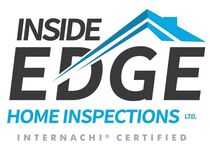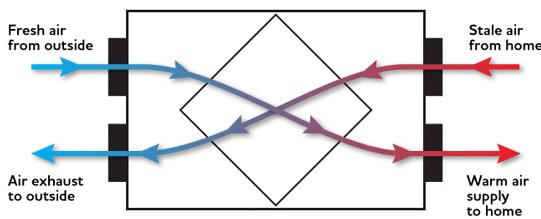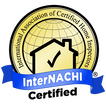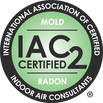Mike's Home Inspector BlogMichael Burfitt |
|
I owe a lot of my skill as a home inspector to the time I spent working at NSCC (Nova Scotia Community College), where I was not only able to access high quality training but was able to see firsthand how complex modern technology helps to create safe, healthy, efficient buildings. NSCC is a leader in sustainable building practices, and I have taken plenty of courses on topics such as Heating, Air Conditioning, Pipe and Air System Design to name a few. I also learned to apply many of these principles to my own home and one project I will be working on soon is to look at replacing our HRV, possibly with a modern ERV. Modern building codes require the installation of mechanical ventilation (i.e. just exhaust fans are no longer acceptable) as modern homes are built very tight for energy saving purposes. What is an HRV? ERV? HRV stands for Heat Recovery Ventilator while ERV stands for Energy Recovery Ventilator. These two systems are very similar with the difference being that an ERV recovers both heat AND moisture. Personally, I think they should be called HMRVs (Heat & Moisture Recovery Ventilators) as this would be a better descriptor. Here is a basic diagram about how these systems work. While it appears the air mixes based on this picture, they remain completely separate with only heat (and possibly moisture) being exchanged. So, Does This Mean a ERV is Better?
Not necessarily. While ERVs are considered a step above HRVs (and more expensive!) opinions vary on which is the right choice in Nova Scotia. While we do have humid summers, having too much humidity is not an issue for the rest of the year and heating is prioritized over cooling in our province. When considering installing a new unit, remember mechanical ventilation is a job that should be left for a qualified HVAC contractor and they can offer the best advice on what will be effective for your situation. How Are These Units Different from an Air Exchanger? An air exchanger does exactly what it says: exchanges air from inside to outside and replaces it with outside to inside air. This works great in theory but in reality it is rare that outside conditions are as comfortable as the ideal indoor conditions. The air outside is typically colder and bringing in constant fresh air without capturing heat from the air vented outside will lead to unnecessarily high energy bills. In short, a HRV is a step above an air exchanger with an ERV being another step above that. HRVs and ERVs Need Maintenance Too! While they are generally very reliable and are designed (and supposed) to run 24 hours a day for 20+ years, they still require regular maintenance just like any piece of HVAC equipment. The biggest faux pas (other than a home missing an HRV/ERV entirely) I see is units that have not been cleaned (often times it is clear they have NEVER been cleaned!). It is important to inspect for proper operation and clean the unit according to manufacturer's instructions, typically once a season. Are these units pricey? Absolutely, but it is a small price to pay for a clean and healthy home! Like most home inspectors, I have read countless articles written by other home inspectors about “How to Choose a Home Inspector” that by an amazing coincidence always seem to include narrow criteria that miraculously describes the inspector writing the article! I promise to never write such a blog post, but I thought with today’s economic conditions where a homeowner or potential homeowner is being squeezed to the limit it might be a good idea to highlight the difference between cost and value. I firmly believe that of the many home inspectors in Nova Scotia, few if any can match the level of value that I, and by extension our company provides. My extensive academic and professional background in both home inspection and building services combined with my friendly, go-above-and-beyond personality (or so I have been told) means that everyone who hires Inside Edge will get a professional, highly detailed, personalized inspection that is easy to understand. As well, thanks to my Commerce Degree and entrepreneurial experience, I am able to keep overhead costs low and pass the savings onto you.  At Inside Edge we tip the scales in your favour every time! At Inside Edge we tip the scales in your favour every time! However, while my value is at the top of the market, I make no apologies for not being the lowest priced in the Halifax area. If anyone is looking for the cheapest possible home inspectors and nothing else, our company is simply not going to be the right choice and never will be. A house is a complicated system of interdependent components, and an inspection should be performed by someone with a high degree of competency and who understands a superficial “drive-by” inspection is not an acceptable practice. Let me make it clear that I am FAR from the only competent inspector in the local market but all the skilled inspectors in our province have one thing in common: they charge more because, like your favourite home inspector, they have invested in advanced education, training and equipment and bring more value to the table. I was once addressing a group of both new and potential immigrants to Canada. There are a lot of misconceptions from people unfamiliar with our country and region, such as the idea of homes in North America being built like tanks (trust me: they aren’t!), newer homes not needing inspections (it’s possible to find just as many issues in new homes as there are in older homes) and that flips are basically brand-new houses (all home inspectors will agree this is ANYTHING but the truth in almost all situations). One thing I made clear was that while my prices are lower than average, I warned that when choosing a home inspector, the total cost should be at the bottom of your concerns. I also pointed out that Nova Scotia, just like most places in Canada, does not require any training or qualifications to become a home inspector and there are ZERO regulations specific to home inspectors aside from the usual requirements to register your business with the provincial government. Yes, you too can start a home inspection company in our province within approximately 2 weeks with just a few hundred dollars and call yourself a home inspector! Caveat emptor indeed. How Do I Know Who to Choose? While I fully believe in my skills and the company I founded, I am aware that not everybody falls in my service area, and I cannot fulfill every request (feast or famine is an apt description of the home inspection industry as my fellow home inspectors across North America can attest to). I am passionate about homes and do not want to see anyone get burned by a bad inspection, whether it be by being given a false sense of security or being unnecessarily spooked by issues that are relatively minor. Here are a few signs of a good home inspection company or home inspector:
In addition, in Nova Scotia, you can always consult the Registry of Joint Stock Companies. All information about businesses registered in the province is public data including information on our corporate structure. This does not guarantee a good home inspection company by any means but can show you if the legal requirements for operating a business in Nova Scotia are being followed. It is important to know that while I am committed to growing Inside Edge and we (and this blog) won’t be going anywhere, the home inspection industry is highly cyclical, with companies always coming and going due to fluctuating market conditions (and not necessarily failing because they are bad home inspectors). This is not a typical career, where a student goes from High School directly to a Home Inspection program and it is important to remember that there are many paths to success in this field. Personally, I wish I was directed to this industry many years before I learned about it but I am glad to be an increasingly popular choice for a home inspector in Nova Scotia. |
Archives
July 2024
Categories
All
|
|
Inside Edge Home Inspections Ltd.
Halifax, NS 902-209-9921 [email protected] Proudly Serving the HRM & Central Nova Scotia |


 RSS Feed
RSS Feed

